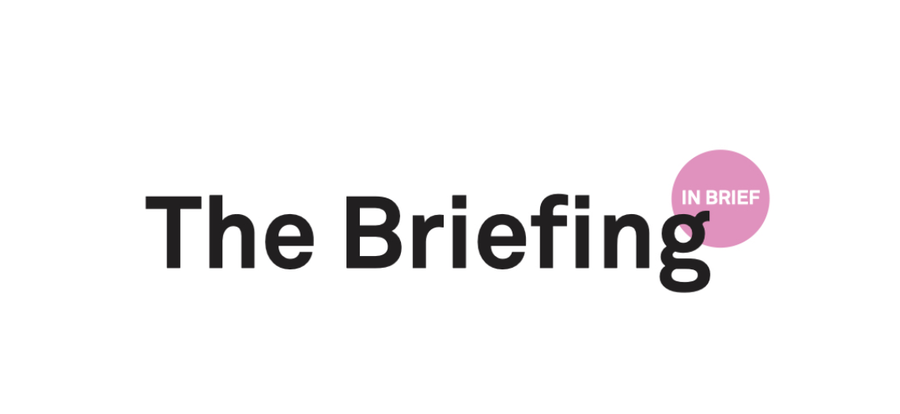Brands Acting Generously
The latest edition of The Briefing, where we highlight key trends and share more on the ideas and insights that are driving innovation today.

The latest edition of The Briefing, where we highlight key trends and share more on the ideas and insights that are driving innovation today.

This Briefing looks at brands that are making space for generosity this year. As we enter 2023, amidst a cost of living crisis and people coming out of covid restrictions fully, the role of a brand in people's lives is changing; brands are expected to play a much more tangible role in the lives of their customers. People choose brands that align with their personal values, but the flip side is that brands can now influence these values.
For context on why brands are pushing generosity, it is crucial to look at the growing side effects of Covid, the pandemic and lockdowns, many of which we are still learning. Many expected that Covid would make society more caring and supportive. Instead, according to the Independent, it appears to have made us more selfish. With the cost of living crisis, the ongoing war in Ukraine, and the constant threat of covid returning, stress and uncertainty have made us much more inward-looking, seeking out personal comfort and prioritising individual needs first.
Post covid, brands are exploring their influence and role within society and individuals' lives for the better. Will brands provide the motivation and inspiration we need to think more collectively?
Could it be that unlike the sustainability movement, where people (now spanning across all generations) demanded brands to become more sustainable and brands had to change their ways? Brands are instead the ones pushing for society to be kinder or are they reacting to a trend before we are all aware of its existence?
We know that people appreciate empathy and kindness when times become challenging (and 2023 is predicted to be challenging.) It is an insightful and proactive move for brands to not only be seen to be kind, but also encourage their customers to do so too, and build loyalty and trust in the long term too.


Comcast connects teens to educate the elderly on the internet
Comcast, the telecommunication company, brings two generations together in their new campaign, 'the Age of Connectivity,' which derives from Comcast's research on the elderly's lack of confidence online.
Teens from a Boys & Girls Club in Detroit acted as 'Digital Navigators' to help educate and empower seniors who needed support in accessing the internet to help combat loneliness and improve digital literacy.
The campaign is part of Comcast's "Lift Zones", an ongoing program where free WiFi is provided in community centres nationwide to help connect and educate underserved communities, enabling full participation in online education and the digital economy.

Adidas and Arsenal No More Red reward volunteers with limited jerseys
Adidas and Arsenal expand their 'No More Red' knife crime campaign by taking the red out of the Arsenal football kit, which both teams will wear in their upcoming games. The jerseys will never be commercially available. Instead, charities and organisations associated with No More Red have ten jerseys each to give to volunteers who they believe are making a positive difference in the community.
The No More Red campaign helps prevent violent youth crime and is awarding and recognising young local champions who make a positive difference in their communities.
Whilst Adidas and Arsenal could have sold these jerseys and donated the earnings, the reward strategy not only encourages people to volunteer but means that the kit is only worn by those who fully reflect the campaign and their community, which in turn continues the positive influence on young people.


Cadbury’s reminds us to be generous to one another
Cadburys latest advert uses storytelling to remind us that their Dairy Milk bars can spread joy. The new advert is a part of the brand's larger mission of pushing generosity through small acts of kindness. Cadbury demonstrates how generosity can bring us closer together, which we have lacked as a society post covid.
The campaign is part of the brand's generosity strategy that has been running for four years. Cadbury's has been praised for their simple but effective storytelling in which familiar authentic places and relationships of everyday life are shown, and remind us that a small act of kindness makes someone's day.

Ikea showcases how the home environment influences our wellbeing
Ikea's latest campaign shows us to help strangers by telling the story of a lonely, grumpy troll who torments the village whenever they cross the bridge, which he lives under. The boy notices the troll's home is dark and damp and offers an IKEA lamp to brighten up his home. Together they transform the space into a warm and cosy home which, as a result, makes the troll happy, and he leaves the villagers alone.
The campaign is a part of IKEA's 'Bring Home to Life' platform, which focuses on 'unlocking our emotional connections to home and the life we live there', which was launched in 2022. IKEA has been researching how our homes affect our mental health and well-being. The purpose of the advertent reminds us that with some attention, we can transform our homes but also, as a result, our lives.


Unwell children meet old & new friends in Ronald McDonald House on Roblox
McDonald's Sweden has created a digital Ronald McDonald House in the platform Roblox, enabling unwell children living in an RMH to invite their friends from home to join them in the digital world.
RHM provide a homelike environment for unwell children and their families while undergoing medical help. Research found that often due to relocating, children are separated from their friends, isolating them and making them lonely. To help solve this problem, McDolands Sweden asked the children to help design a house in Roblox, where they cater to all ideas. The house will be an ongoing project and will be updated yearly.

Jumbo introduces slow checkout lanes for lonely seniors
Jumbo, a Dutch grocery chain, noticed that there was little human connection with the move to self-service checkouts. Jumbo research found that for some of the elderly, talking to a cashier was the only social interaction they would have all day. Whilst self-service benefited some people, it stopped others from fulfilling their need for human connection.
To help improve the experience for all, they created an optional ‘chat checkout’ in 2019 for customers who want to have a conversation with the cashier. The overwhelming success has resulted in 200 slow lanes have been opened across the nation. With many retailers pushing digitalisation, it is great to see a brand that understands its customers and provides the right experience for them.

We have identified 4 key insights, why they are important and the possible opportunites
1. Personalisation needs to improve people's experience
Why: People expect a level of personalisation within their experience and are looking for communities and spaces that make them feel seen, represented and understood.
Your opportunity: Brands that are solving problems for underrepresented or overlooked customers are improving the experience and, in turn, are being rewarded with their loyalty. These brands also show potential customers that they care about their specific community.
2. Brands are encouraging the importance of human connection
Why: People are feeling more divided than unified nowadays and looking to brands to help bring them together and unify them.
Your opportunity: Those brands who are highlighting the importance of human connection and are bringing together like-minded people have a stronger, loyal and active community.
3. Brands act as role models to guide customers
Why: As brands play more tangible roles in consumers' lives, people are turning to brands as a source of guidance, trust and inspiration in everyday life.
Your opportunity: Brands who rise up and act as role models can help influence their customers to become better members of the brand community and society, representing their brand in a positive light. In turn, their customers will award the brand with their trust and become more attached to the brand and its values.
4. Brands need their communities to reinforce shared values
Why: As people increasingly choose brands based on their personal values, brands need their customer base to reflect and align with these values, resulting in a symbiotic relationship. Essentially, whoever wears the brand is a form of an influencer.
Your opportunity: Brands that encourage and reward kind and generous behaviour within their community have positive ‘influencers’ to spread awareness of the brand. The result is that the brand presents a coherent message, values and community group that attracts like-minded individuals, continuing the cycle.

A summary of what we’ve covered in this edition of the briefing
Trend Recap: Brands are exploring their influence and role within society and individuals' lives. As brands highlight kindness and generosity and encourage us to think more collectively as a society.
We can't help but wonder, are brands the ones pushing for society to be kinder or are they reacting to a trend before we are all aware of its existence?
3 Takeaways
1. Personal Innovation Favourite: Adidas and Arsenal expand their 'No More Red' knife crime campaign by taking the red out of the Arsenal football kit and awarding them to volunteers who they believe are making a positive difference in the community.
The kit is only worn by those who fully reflect the campaign and their community, which in turn continues the positive influence on young people.
2. Brands are acting as role models by encouraging people to be more generous.
3. Brands are positively influencing their communities to reflect the brand's values.
See more of our regular 'Briefings' here - https://bit.ly/3rylWGs
Let us know below what you think and get in touch if you want a further breakdown of any specific trend at hello@dalziel-pow.com

The first ever SXSW London took over Shoreditch this month, offering a wealth of inspiration and insights across tech, business and culture. We share our thinking into how it can return even bigger and better for 2026.

